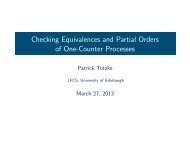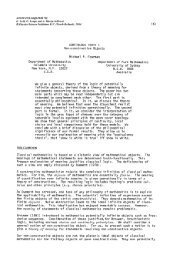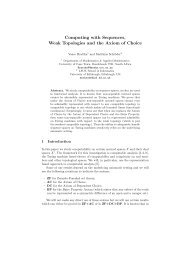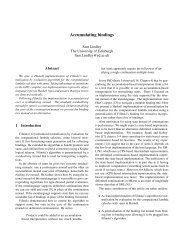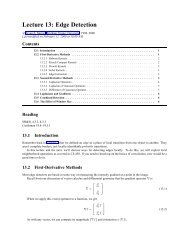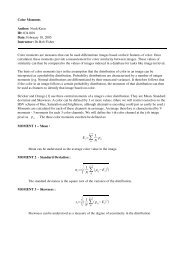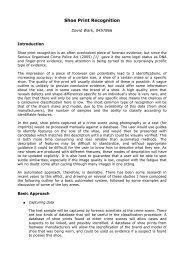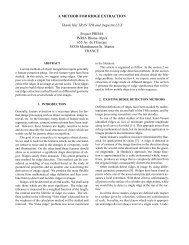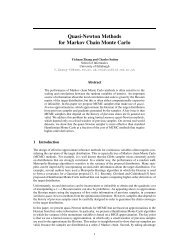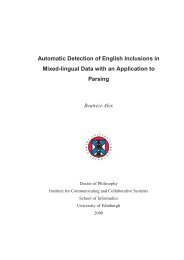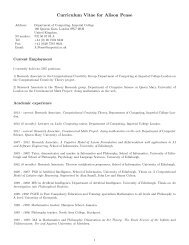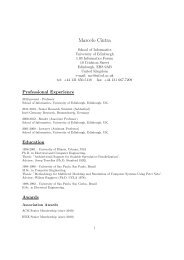- Page 1 and 2: The Effectiveness of Health Care Te
- Page 3 and 4: Appendix II Knowing the way: Effect
- Page 5 and 6: Christine Carmichael June 1997 - Fe
- Page 7 and 8: The objectives of the research were
- Page 9 and 10: Index, Dr Foster; deaths within 30
- Page 11 and 12: Chapter 1 Teamwork, Communication a
- Page 13 and 14: • Flat organisations can be monit
- Page 15 and 16: audit of the case managers' records
- Page 17 and 18: Specifically, West and Wallace (199
- Page 19 and 20: There is some evidence that team me
- Page 21 and 22: circumstances efficient teamwork re
- Page 23: selected the best option. Following
- Page 27 and 28: Thus the health care team may focus
- Page 29 and 30: integrates interventions (Tannenbau
- Page 31 and 32: to provide shared direction and ena
- Page 33 and 34: Inputs Teams work within a domain s
- Page 35 and 36: Chapter 2 Primary Health Care Team
- Page 37 and 38: midwives); 33.5% administrative sta
- Page 39 and 40: External ratings - team effectivene
- Page 42 and 43: Location Four location categories w
- Page 44 and 45: functioning, issues of team process
- Page 46 and 47: Organisational Context Figure 2.11
- Page 48 and 49: Figure 2.12: Consultation and Quali
- Page 50 and 51: Figure 2.13: An example of the layo
- Page 52 and 53: stakeholders was sufficiently compr
- Page 54 and 55: enefit to all aspects of primary he
- Page 56 and 57: Introduction The data analysis expl
- Page 58 and 59: those which might ultimately predic
- Page 60 and 61: Figure 3.4: Relationship between te
- Page 62 and 63: It seems that professional diversit
- Page 64 and 65: Bearing in mind that a larger score
- Page 66 and 67: Figure 3.15: Clarity of Leadership
- Page 68 and 69: Summary of Findings Chapter 4 Quali
- Page 70 and 71: of the workshops and consultations
- Page 72 and 73: Chronic disease management • effe
- Page 74 and 75:
Accountability • meeting NHS care
- Page 76 and 77:
Checklist of activities which contr
- Page 78 and 79:
Objective 1 - Promote, maintain and
- Page 80 and 81:
Objective 5 - High team member comm
- Page 82 and 83:
Measure 2 - Young People’s Sexual
- Page 84 and 85:
Percentage of team members who repo
- Page 86 and 87:
determined the percentage of patien
- Page 88 and 89:
test their generalisability for pri
- Page 90 and 91:
Introduction Chapter 5 Community Me
- Page 92 and 93:
As the Health Team Effectiveness re
- Page 94 and 95:
CMHTs managed. The main reasons for
- Page 96 and 97:
Section 4: Biographical information
- Page 98 and 99:
Number of members % of women 35 30
- Page 100 and 101:
Figure 5.4: CMHT occupational group
- Page 102 and 103:
CMHT response to emergency referral
- Page 104 and 105:
number of teams 50 40 30 20 10 0 Tu
- Page 106 and 107:
Team average tenure Average job ten
- Page 108 and 109:
� Team processes: team processes
- Page 110 and 111:
made about the running of the team.
- Page 112 and 113:
single evaluative or morale factor.
- Page 114 and 115:
turn, team characteristics were ent
- Page 116 and 117:
• Teams using integrated client c
- Page 118 and 119:
Team Inputs Information about the t
- Page 120 and 121:
Results The method of analysis was
- Page 122 and 123:
Figure 6.4: Impact of team processe
- Page 124 and 125:
4.5 4.0 3.5 3.0 2.5 2.0 -.2 0.0 .2
- Page 126 and 127:
external rating of team innovation
- Page 128 and 129:
meetings), beta = -.20, t = -2.20,
- Page 130 and 131:
Two factors, acting independently o
- Page 132 and 133:
that the majority of such training
- Page 134 and 135:
In relation to recruitment and rete
- Page 136 and 137:
Chapter 7 Community Mental Health T
- Page 138 and 139:
Figure 7.1: Process and effectivene
- Page 140 and 141:
Figure 7.2: Client caseload profile
- Page 142 and 143:
Figure 7.3: Summary of selected cli
- Page 144 and 145:
83 per cent of selected clients wer
- Page 146 and 147:
Figure 7.5: Summary of health econo
- Page 148 and 149:
Team I 39 26 33 Team J 45 39 13 TOT
- Page 150 and 151:
Figure 7.11: Costs and clinical tar
- Page 152 and 153:
Overall costs Overall cost per clie
- Page 154 and 155:
Referrals pooled in the team/number
- Page 156 and 157:
12 months. Of course, some of these
- Page 158 and 159:
We were also forcibly reminded of t
- Page 160 and 161:
Section 1: Biographical information
- Page 162 and 163:
comprised of six items with five in
- Page 164 and 165:
• Does your team have relatively
- Page 166 and 167:
The mean caseness of teams was 23.3
- Page 168 and 169:
Response Fifty-seven teams particip
- Page 170 and 171:
health care areas. For example, a b
- Page 172 and 173:
The Coronary Care Unit This team is
- Page 174 and 175:
specialities. The clinicians are in
- Page 176 and 177:
Summary of Findings Chapter 9 Secon
- Page 178 and 179:
Analysis of variance within and bet
- Page 180 and 181:
Role Conflict 148.16 1,2147
- Page 182 and 183:
etween team membership types in str
- Page 184 and 185:
237 team members (752 nurses, 114 d
- Page 186 and 187:
Multiple Team Membership Most peopl
- Page 188 and 189:
higher level unit (organisation, th
- Page 191 and 192:
Team size and type of Trust are ass
- Page 193 and 194:
Introduction Chapter 10 Meetings an
- Page 195 and 196:
Even in relatively small groups, ac
- Page 197 and 198:
did not code finer timing informati
- Page 199 and 200:
Figure 10.2: Communication in a pri
- Page 201 and 202:
Figure 10.4: Communication in a com
- Page 203 and 204:
Summary of Findings Chapter 11 Anal
- Page 205 and 206:
team's size (unrelated t-tests, all
- Page 207 and 208:
meetings, we will return to why thi
- Page 209 and 210:
taken up by "any other business" ra
- Page 211 and 212:
attendance to GPs and the practice
- Page 213 and 214:
(See Figure 11.8). The graph includ
- Page 215 and 216:
members in other ways. From the con
- Page 217 and 218:
equal responsibility subset (for eq
- Page 219 and 220:
Types of Meetings The number of dif
- Page 221 and 222:
Figure 12.2: Four Categories of Pra
- Page 223 and 224:
Teams which are commissioned by hea
- Page 225 and 226:
Although the meetings fell into the
- Page 227 and 228:
Figure 12.5: Duration of meetings i
- Page 229 and 230:
chairing meetings, such cases illus
- Page 231 and 232:
Attendance at meetings The CMHT mee
- Page 233 and 234:
describe the overall nature of CMHT
- Page 235 and 236:
Chapter 13 Conclusions and Recommen
- Page 237 and 238:
� Leadership also emerges as crit
- Page 239 and 240:
care teams must therefore be traine
- Page 241 and 242:
3. Team composition Today’s healt
- Page 243 and 244:
always be to move as quickly as pos
- Page 245 and 246:
customer satisfaction with retail o
- Page 247 and 248:
In traditional organisations, power
- Page 249 and 250:
Team processes When TBW is introduc
- Page 251 and 252:
Appendix I Measures Used Primary He
- Page 253 and 254:
Accessibility of the service to use
- Page 255 and 256:
Introduction The World Health Organ
- Page 257 and 258:
From this conceptual, background Po
- Page 259 and 260:
Com peting Values M odel Internal H
- Page 261 and 262:
care and of taking into considerati
- Page 263 and 264:
derived from 100 teams, examining t
- Page 265 and 266:
Rational Goal Objectives Example In
- Page 267 and 268:
Human Relations Objectives Example
- Page 269 and 270:
contingencies for each indicator, t
- Page 271 and 272:
Centre Steven Campbell Research Ass
- Page 273 and 274:
Appendix III Effectiveness Measures
- Page 275 and 276:
Objective: Promote, maintain and im
- Page 277 and 278:
Effectiveness To what extent......
- Page 279 and 280:
Relevance To what extent...... Are
- Page 281 and 282:
∗ If the measures suggest that th
- Page 283 and 284:
Measure 4 - Patient access to consu
- Page 285 and 286:
Next steps • Compare the average
- Page 287 and 288:
whether steps could be taken to ens
- Page 289 and 290:
Measure 8 - Patients have access to
- Page 291 and 292:
Objective: Efficient Use of Resourc
- Page 293 and 294:
Date: Day of week: Name: Job title:
- Page 295 and 296:
Measure 11 - Patients/clients who d
- Page 297 and 298:
Measure 12 - Efficient use of admin
- Page 299 and 300:
Objective: Continuous personal and
- Page 301 and 302:
Measure 16 - Team members use each
- Page 303 and 304:
Objective: Responsiveness to client
- Page 305 and 306:
Measure 19 - Patients’ experience
- Page 307 and 308:
5. The last two times that you aske
- Page 309 and 310:
18. In the last month: How many mor
- Page 311 and 312:
___________________________________
- Page 313 and 314:
Letters were sent to all the primar
- Page 315 and 316:
(ii) The principles of effective te
- Page 317 and 318:
• Which aspects of the PHCT servi
- Page 319 and 320:
the person’s environment such as
- Page 321 and 322:
Handout 3 Practical tips and guidel
- Page 323 and 324:
‘The best and most cost-effective
- Page 325 and 326:
feedback on performance against tho
- Page 327 and 328:
Handout 6 Practical tips and guidel
- Page 329 and 330:
Teamworking Mechanisms for reviewin
- Page 331 and 332:
Efficient use of resources Of no Ve
- Page 333 and 334:
Handout 10 Practical tips and guide
- Page 335 and 336:
Handout 12 Practical tips and guide
- Page 338 and 339:
Handout 14 Measuring Quality of Car
- Page 340 and 341:
Handout 16 Practical tips and guide
- Page 342 and 343:
Handout 18 Practical tips and guide
- Page 344 and 345:
Handout 20 Practical tips and guide
- Page 346 and 347:
Handout 22 Practical tips and guide
- Page 348 and 349:
Handout 24 Practical tips and guide
- Page 350 and 351:
Berger, J., Fisek, M.H., Norman, R.
- Page 352 and 353:
Department of Health (1990). The Ca
- Page 354 and 355:
Guzzo, R.A. & Shea, G.P. (1992). Gr
- Page 356 and 357:
King, N. (1990). Innovation at work
- Page 358 and 359:
Myer, C. (1993). How to Align Purpo
- Page 360 and 361:
Schober, M.F., & Clark, H.H. (1989)
- Page 362 and 363:
groups. Academy of Management Journ



